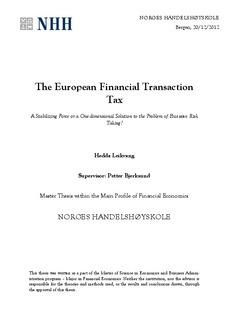| dc.description.abstract | In the wake of the financial crisis, the movement advocating for a financial transaction tax gained considerable support, culminating in the presentation of a proposal for such a tax
by the European Commission on September 28, 2011. This thesis researches and analyzes the
use of a financial transaction tax in light of the stated purpose of the Commission’s proposal.
The primary goals of the tax are to (1) raise revenue, (2) curb excessive volatility, and (3) harmonize the internal market. Taxes are most commonly implemented for their revenue-raising
qualities rather than as tools for remedying market distortions. In contrast, many view the primary function of the financial transaction tax as a regulatory tool to minimize excessive risk
taking in financial markets. Although this thesis will analyze the potential effects on revenue
and the tax’s ability to contribute to harmonization of the internal market, the primary focus is on the volatility-reducing effect regulatory authorities can expect from implementing such a tax.
Although the thesis will use the European Commission proposal for a financial transaction
tax as its starting point, it will also review other variations on the financial transaction tax. The thesis will also present alternative measures that should be considered for achieving the goals set forth by the European Commission in lieu of, or in addition to, a financial transaction tax, and evaluate these measures in light of the advantages and disadvantages of the financial transaction tax. The thesis concludes that while a financial transaction, in theory, may seem like a dynamic solution that could accomplish several different goals, a multifaceted approach tailored to each individual issue is likely to create a more strategic solution in the long run. A more narrowly tailored strategy is also less likely to negatively affect GDP and trading patterns than a financial transaction tax. | no_NO |
